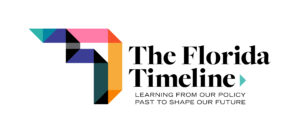The Florida Timeline
-
by
Erin Baird

By Daniel Gibson
I recently met with Florida Policy Institute’s (FPI) leadership team to better understand their work in Florida. FPI is a long-time partner of Allegany’s and is currently the recipient of a St. Clare grant.
One of my favorite discoveries of theirs is a new education tool called The Florida Timeline. Do yourself a favor and visit The Florida Timeline website and watch the brief 2-minute introductory video on the first page. If you enjoy the video, explore the website and maybe share it with others. I checked it out today, and somehow they make the history of FL’s tax laws relevant and fascinating.
The Florida Timeline identifies how intentional and systemic racism has permeated historical laws in Florida and continues to reverberate in modern-day policy. In other words, it provides brief historical milestones that explain how and why FL continues to experience episodes of blatant racism and social injustices.
In recent years, as I have become more vocal and comfortable raising up issues of race and homophobia, some people have asked, “How much longer do we have to talk about racism and white supremacy? Why do we have to continue to focus on painful pasts and the stupid acts of a small minority of people today?” My answer, “to overturn centuries of injustices and develop effective and equitable solutions, we must first understand how we got here.”
Racism has plagued our country for 500 years. Oppressed communities have only recently begun to experience the healing that comes from speaking one’s truth. I say, rather than silencing our past, why not study it to understand the foundational ideas and beliefs behind our broken systems so that maybe we won’t keep repeating history.
I find the timeline project thought-provoking. We benefit from hearing our history, ALL of our histories. People still aren’t aware (or choose not to believe) the truth that the United States has a long and painful precedence for the intentional development and promotion of racist and sexist systems that oppress certain groups while benefiting others.
I applaud FPI for developing an easy and accessible way to bypass the “wonky legalese” of most policy briefs by providing compelling historical backgrounds to some of our state’s and country’s most egregious and unhealthy social norms.




